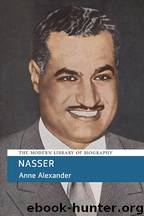Nasser by Anne Alexander

Author:Anne Alexander
Language: eng
Format: epub
ISBN: 978-1-910376-86-7
Publisher: Chicago Distribution Center (CDC Presses)
Published: 2017-05-16T04:00:00+00:00
There was another side to Nasser’s public persona: his distance from his old comrades was part of his projection of what Ghali Shoukri calls ‘his metaphysical faith in his own union with the people.’120 In his rhetoric of the period, Nasser spoke directly to ‘the people’ in his own name, the collective decisionmaking of the early days had long vanished. ‘His decision is democracy itself, his thought is the people, and technical means are the modern substitute for the party in an under-developed country.’121
Nasser’s skills as an orator played a crucial role in the creation of ‘Al-Ra’is’. Perhaps his most enduring legacy has been the impact of his rhetoric on the Arabic language itself. He spoke at hundreds of meetings, many times covering several rallies on the same day. Many other Arab leaders, particularly those who, formally at least, held the same nationalist or socialist ideals as he did, followed his example in bringing the everyday language of the street into the realm of high politics.
The registers of modern Arabic are more varied, and lie further apart than modern English. Arab children grow up speaking a dialect of Arabic, but this colloquial language is almost never written down. At school they will be taught standard Arabic, which is the language of literature and the media. If they are Muslims, they will probably also be taught to read and understand classical Arabic, the language of the Qur’an – essentially the dialect of 7th-century Arabia. In a society where only the privileged few had access to education at all, Nasser’s audiences were remarkably sensitive to language register as a marker for social status and authority.
Under the monarchy, most politicians used ornate, high-flown rhetoric. Nasser’s approach was different. Rather than abandon standard Arabic altogether – and thus lose his ability to address audiences outside Egypt who spoke other Arabic dialects – Nasser adopted a technique of switching registers. In a speech in 1965 discussing the definition of socialism he introduces an imaginary questioner, who pipes up in Cairene dialect to demand a simpler explanation. Nasser starts off saying that socialism can be defined as: The correct… interpretation of the revolution in terms of progressive action. The speech then becomes a dialogue as Nasser takes the part of the audience: But what’s ‘socialism’ mean, then? He answers his own question in the same formal language that he used initially, but the meaning is clearer and the sentence structure simpler: ‘Socialism.’, in a word means the establishment of a society of sufficiency and justice … the establishment of a society of equal opportunity.122
By the 1960s, Nasser had broadcast hundreds of hours of speeches using this technique, but during the mid-1950s, when he first adopted it, his style was a dramatic signal that in the officers’ new republic, politics was no longer the preserve of the elite. It was also through his speeches, far more than his published writings, that he developed his ideas. His speeches are peppered with key phrases – dignity, freedom, glory, unity – which he repeated time and time again.
Download
This site does not store any files on its server. We only index and link to content provided by other sites. Please contact the content providers to delete copyright contents if any and email us, we'll remove relevant links or contents immediately.
Fanny Burney by Claire Harman(26598)
Empire of the Sikhs by Patwant Singh(23079)
Out of India by Michael Foss(16849)
Leonardo da Vinci by Walter Isaacson(13323)
Small Great Things by Jodi Picoult(7124)
The Six Wives Of Henry VIII (WOMEN IN HISTORY) by Fraser Antonia(5509)
The Wind in My Hair by Masih Alinejad(5093)
A Higher Loyalty: Truth, Lies, and Leadership by James Comey(4958)
The Crown by Robert Lacey(4812)
The Lonely City by Olivia Laing(4799)
Millionaire: The Philanderer, Gambler, and Duelist Who Invented Modern Finance by Janet Gleeson(4473)
The Iron Duke by The Iron Duke(4352)
Papillon (English) by Henri Charrière(4265)
Sticky Fingers by Joe Hagan(4192)
Joan of Arc by Mary Gordon(4106)
Alive: The Story of the Andes Survivors by Piers Paul Read(4025)
Stalin by Stephen Kotkin(3962)
Aleister Crowley: The Biography by Tobias Churton(3637)
Ants Among Elephants by Sujatha Gidla(3463)
